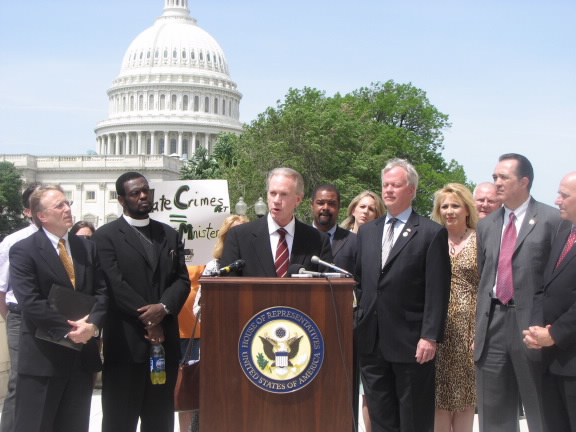
WASHINGTON (BP)–Legislation to extend hate crimes protections to homosexuals and transgendered individuals could severely restrict religious freedom, foes of the proposal said April 28 as they sought to rally opposition.
Members of the House of Representatives and leaders of evangelical Christian and conservative organizations, including the Southern Baptist Convention’s ethics entity, warned about the bill’s impact at a Capitol Hill news conference on the eve of the measure’s consideration in the House. The Democratic leadership was expected to bring the Local Law Enforcement Hate Crimes Prevention Act, H.R. 1913, to the House floor April 29.
The measure would add “sexual orientation” and “gender identity” to the current classes — including race, religion and national origin — protected from hate crimes. “Sexual orientation” includes homosexuality, while “gender identity,” or transgendered status, takes in transsexuals and cross-dressers.
“This bill puts Christians and many other religious groups in the government’s crosshairs,” Barrett Duke said at the news conference. Duke is vice president for public policy and research of the Southern Baptist Ethics & Religious Liberty Commission.
“While we should never condone acts of violence against anyone, for whatever reason, including whether or not that person is a homosexual, this bill proposes to prosecute someone based on their belief about homosexuality and therefore makes religious belief a germane issue in this debate,” Duke said. “Anyone who holds a religiously based belief about homosexuality is immediately suspect of engaging in a hate crime if a homosexual is involved, even if the person was unaware that the victim was a homosexual.
“Those who teach that homosexuality is contrary to God’s design may find that they as well are targeted by this law,” Duke said.
Current law, combined with the hate crimes measure, could cause problems for Christians and other religious adherents who believe homosexual behavior is a sin, said Rep. Louie Gohmert, R.-Texas.
“If you aid or counsel or induce someone to commit a crime, then you are just as guilty as the one who committed the crime” under existing law, said Gohmert, a member of a Southern Baptist church. “[I]f you can say that someone’s ‘sexual orientation’ is against Bible teaching or the teaching of the Tanach or the Koran, then you have just said that something is wrong, and if that stirs someone or induces someone to go out and commit an act of violence, which all of us are against, then just the inducement would be enough to go after a minister, a rabbi or an imam who says, for example, ‘Homosexuality, under the teachings of the Bible, the Tanach, the Koran, it’s wrong.’
“That could be argued to induce criminal conduct,” Gohmert said at the news conference. “And that would allow pastors to be arrested for saying things are wrong.
“It would not take too many arrests to have an extraordinary, chilling effect on some religious teachings with regard to homosexuality.”
The bill’s opponents not only charge it could infringe on religious liberty, but they say current state laws make it unnecessary; it would grant protection based on behavior; it would threaten free-speech rights; and it would move federal law toward punishing thoughts and beliefs, since the motivation of a person charged with a hate crime would have to be evaluated.
Supporters of the legislation deny it would target religious freedom and free-speech rights. The bill includes language saying it will not “be construed to prohibit any expressive conduct protected from legal prohibition by, or any activities protected by the Constitution.” Backing the measure are homosexual-rights advocates and their allies, including the ACLU, NAACP, Anti-defamation League and People for the American Way.
The House appears ready to pass the bill, but Gohmert said the late outcry could be helpful.
“They probably have the votes to pass it in the House,” Gohmert told Baptist Press after the news conference. “In the Senate, there should be senators who are scared to death who are coming up for election because [of opposition to the legislation in their states]…. And if there were no noise made here as it comes through the House, the senators would think they are safe, and they’re not safe. They’re at risk, and they need to understand that.”
Other House members who spoke against the legislation at the news conference were Republican Reps. Paul Broun of Georgia, Trent Franks of Arizona and Jim Jordan of Ohio. Broun and Franks are both members of Southern Baptist churches. Among other organizations represented at the news conference were Concerned Women for America, High Impact Leadership Coalition, Traditional Values Coalition and National Black Church Initiative.
If the bill gains congressional approval, President Obama is expected to sign it.
The House and Senate both passed similar legislation in 2007. Under threat of a veto from President Bush, the houses failed to agree on a final version.
The legislation would authorize the U.S. attorney general to provide assistance to state and local officials in the investigation and prosecution of hate crimes. The bill says a hate crime is one “motivated by prejudice based on the actual or perceived race, color, religion, national origin, gender, sexual orientation, gender identity, or disability of the victim or is a violation of the State, local, or Tribal hate crime laws.”
The penalty for a hate crime could be as much as 10 years in prison or, in some cases, up to a life sentence.
–30–
Tom Strode is Baptist Press Washington bureau chief.

















